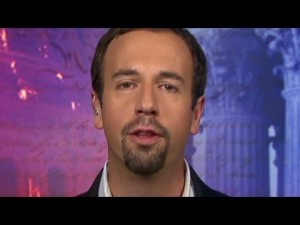It’s always hard to see people leave the Godbeat, even while you wish them well. Dan Gilgoff has been a religion news writer for as long as I’ve been here at GetReligion and his most recent work — at CNN’s Belief Blog — has probably been my favorite.
But now he’s abandoned us for a fancy job as director of digital news at National Geographic! At least we’ll still have Eric Marrapodi there.
As he left, he wrote up the five things he learned from his three years of editing CNN’s Belief Blog. It includes the explosion of “nones” in the religious landscape. My favorite was this one:
3.) Religion reporting shouldn’t be an inside game. “We believe that understanding the role of faith in today’s world isn’t optional or nice to know,” we wrote in our inaugural Belief Blog post, in May 2010. “It’s need to know.” That was true again for many of 2012’s biggest stories, for which understanding forces of faith and faithlessness were crucial to understanding the nominees for president, reactions to July’s deadly Aurora, Colorado, shooting and Whitney Houston’s funeral. You don’t have to be religious to think religion stories matter; you just have to be curious about the way the world works. I believe that more now than I did when we launched the Belief Blog.
You just have to be curious about the way the world works. Exactly. And then he cautions people who sense an anti-religious bias in the news media:
4.) The news media isn’t anti-religion. You hear that from some religious people, particularly those on the political right. Truth is, news organizations such as CNN are fascinated by religion because it yields stories brimming with meaning, controversy and powerful characters. But the religion beat can scare off reporters because it can be so daunting (if you’re a non-Mormon, try wrapping your mind around the Mormon practice of posthumous proxy baptism in time to meet a 5 o’clock deadline). And yet so many CNN Belief stories were born when CNNers across the organization asked basic questions such as, “Will the Catholic presidential candidates don ashes for an Ash Wednesday debate?” and “Why don’t we explain why some American Muslim women wear the hijab?” Many other religion stories came from CNNers who volunteered ideas from their own religious subcultures. CNN forces working against religion coverage? I never encountered any.
You know, I enjoy this answer but it reminds me of something I’ve desired to see more of in general. I wish that we’d see much more reflection on and self-analysis of why, exactly, it is that some religious folks (even if I disagree that this sentiment is only expressed by those on the political right) sense a hostility from the media toward religious views or people who hold them. I think there is value in more reflection on and less dismissal of complaints against us as journalists. But that’s what I’d put on my list of five, so I should just move on.
Finally, and I’m glad to see this from someone who did so much to advance digital journalism as it relates to the Godbeat, we get this reflection:
5.) In the world of digital journalism, your voice matters more than ever. With the proliferation of reader comments, social media and instantaneous metrics on what our audiences are clicking and how they’re responding, your choices and opinions are shaping our coverage more than ever. Some of our best content from the last year was more about conversations happening around the news than about the news itself. We choose to do certain stories and skip others partly based on whether you’re engaged in those stories or not. Use your power wisely.
I love it. I also love the generally positive take Gilgoff has throughout his piece. We see so many people lamenting the demise of journalism and not enough journalists embracing the way digital media change what we do. I absolutely love that Gilgoff doesn’t just remind readers of their power, but encourages them to use this immense power prudently.
So best wishes to Gilgoff as he heads off to National Geo — I’m sure they’ll be very pleased with their hire.








